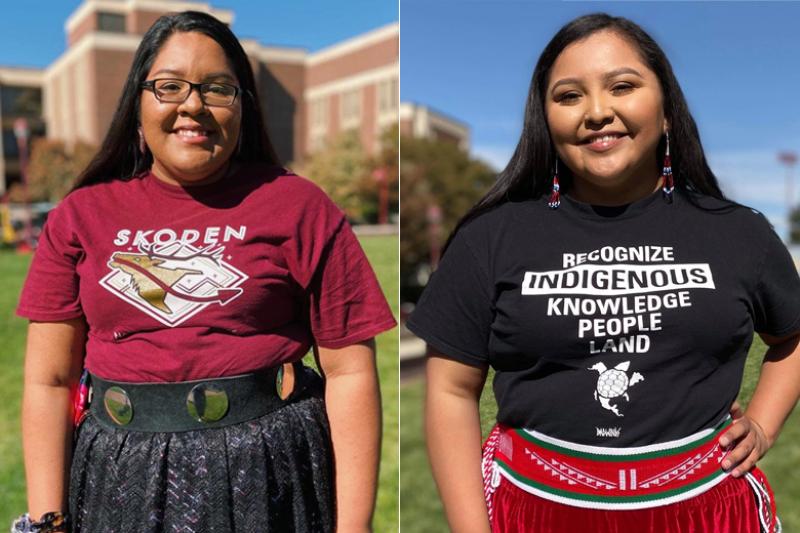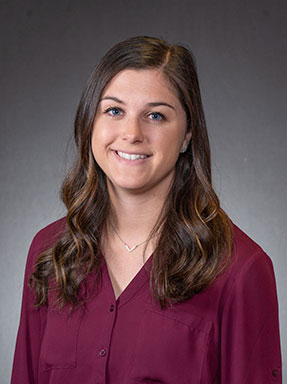Celebrating Native American Heritage Month
DU Students Alexis White Hat and Raelene Woody

The University of Denver is committed to living our values of diversity and inclusion. We recognize that our community and institutional success is dependent on how well we engage and embrace the rich diversity of our faculty, staff, administrators, students and alumni. With that shared value in mind, throughout this academic year, we plan to publish a series of articles to celebrate cultural and ethnic heritage months. In partnership with Human Resources & Inclusive Community and the Staff of Color Association (SOCA), we will feature a staff or faculty member and a student in recognition of each heritage month, along with an event to honor one another and learn about our unique differences.
In recognition of Native American Heritage Month, DU Students Rae Woody and Alexis White Hat agreed to share stories of their heritage, traditions and college experience with the DU Newsroom. Their remarks have been edited for clarity.
Alexis White Hat is a second-year student majoring in anthropology and history with a minor in critical race and ethnic studies. She grew up and still lives on the Rosebud Reservation in Saint Francis, South Dakota. Her mother is Lakota, and her father is Diné, and White Hat is an enrolled member of the Rosebud Sioux Tribe. Her grandfather, Albert White Hat Sr., instilled in her family the Lakota ways, values and language.
Raelene Woody is a senior majoring in psychology and minoring in sociology and communication studies. A first-generation college student, she is Diné and comes from a small community on the Navajo Nation called Tsayatoh near Gallup, New Mexico. She grew up in Cochiti Lake, New Mexico, where she spent most of her life. Woody returns home every summer to be with family and participate in the annual feast at Cochiti Pueblo.
How do you honor and celebrate your heritage?
Woody: The communities I’ve grown up in all hold core values that are important to our identity as indigenous people, and I always do my best to live up to those values of humility, respect, integrity, dedication, kindness and generosity. I represent my people everywhere I go and introduce myself in my native language to let my relatives know that I am there with them. Honoring my family and their part in my journey is important to me, as everything I have learned about myself, my heritage and my people comes from their teachings.
Speaking my language whenever I can with my peers, listening to our oral histories, praying, taking up space and representing my communities are all ways that I honor and celebrate my heritage and the hundreds of years of indigenous knowledge that have been passed on to me.
White Hat: A big way I try to honor my ancestors and heritage is by coming to DU and furthering my education, so I can help my people in the future. I am also my tribe’s royalty, Miss Rosebud 2019–20, which means I help represent our tribe and my family. Practicing and honoring my culture at least every day has helped me keep going when it gets hard at DU. But I try to do something that keeps me connected with my culture on a daily basis.
What do you wish more people understood about your heritage?
White Hat: I wish people would understand that we are not a part of the past or history and that we are still. We also aren’t all the same people; different tribes have different cultures and traditions. Actually, there are over 570 amazing tribes with their own stories and traditions that are still thriving today. Native people have been mistreated and abused for many years, but we continue to stay resilient, and we keep pushing forward.
Where do you find your sense of community at DU?
White Hat: The Native Student Alliance (NSA) is where I found my community/ family on campus. NSA has been the main support system while attending DU because we all understand how it is coming to DU as a Native student. It can always be a tough transition from a community of all Natives to a campus of predominantly white students, and NSA helped me the most with that transition during my first year. When I was getting homesick or the quarter was getting rough, I knew I could see my friends in NSA and just laugh and have fun. NSA has become more than a student group, and they have become my family and support system while DU.
Woody: My sense of community comes from the indigenous faculty and students on campus and in my soror sisters — I am a sister of Theta Nu Xi Multicultural Sorority Inc. An academic space like DU can be a tough environment to be in, but I find comfort, community and love in the indigenous students on campus. I have found a family at DU with whom I can share laughs, experiences and struggles. Learning to navigate these academic spaces together and speaking our native languages with each other has created such a strong community that I love being a part of. We have a commitment to love and support one another, and I feel this love and support every day that I am here. Our indigenous faculty have also dedicated their time to create spaces for us and build an incredible support system.
Tell us more about DU’s Native Student Alliance and the goals for this school year.
Woody: I am one of the co-chairs for the organization and have been involved in NSA since my first year at DU. I felt a sense of belonging in NSA as soon as I arrived on campus. It is important that we raise awareness of important issues in Indian Country. We just recently opened an exhibit in the Anderson Academic Commons as part of Native American Heritage Month to raise awareness of the epidemic of Missing and Murdered Indigenous Women, Girls, Two-Spirit and Trans People. It is also important that we make our presence known, love and support one another and create spaces for indigenous students on campus.



